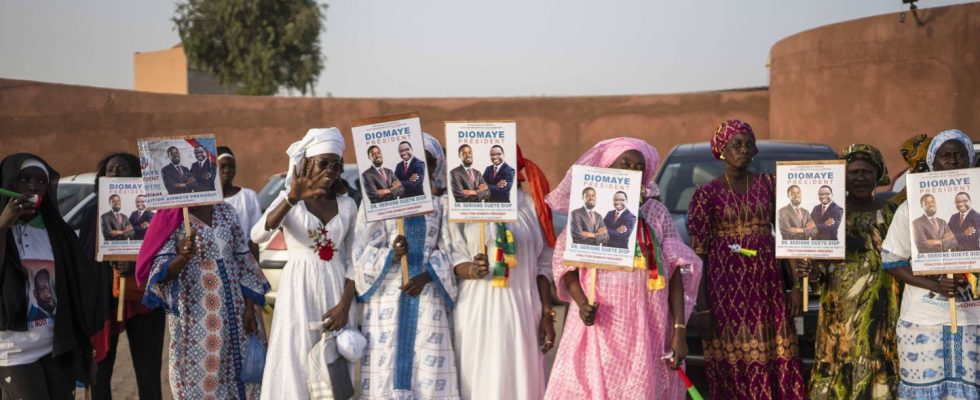Just a few minutes before the end of the presidential campaign in Senegal, Bassirou Diomaye Faye walks with measured steps onto a platform holding the hands of his two wives, Marie and Absa. A scene never seen before in the national political space.
Applauded by thousands of jubilant supporters, the candidate of rupture and pan-Africanism chose to openly display his polygamy, a traditional and religious practice firmly anchored in Senegalese culture, before his triumphant election in the first round of voting. with 54.28% of the votes.
“A consecration of the tradition of polygamy”
Little known until now, Marie Khone, the first woman he married fifteen years ago and with whom he has 4 children, comes from the same village as him. He married the second, Absa, a little over a year ago. “It is a consecration of the tradition of polygamy at the top of the State with a situation which will stick to the Senegalese reality”, estimates the sociologist Djiby Diakhaté, adding that this practice is “popular” by many men but that many women remain “suspicious” of the principles governing it.
Polygamy has long been a subject of controversy in this country made up of more than 90% Muslims, but the public appearance of “BDF” surrounded by his two wives has placed the subject at the heart of debates, in the media, on social networks and within households, provoking various reactions.
A practice that divides the country
A renowned sociologist Fatou Sow Sarr, for her part, posted on X that “polygamy, monogamy, polyandry are matrimonial models determined by the history of each people”. Before quickly publishing another message on the same social network: “my deepest thought is that the West has no legitimacy to judge our cultures”.
However, many women in Senegal speak out against this practice, which they consider hypocritical and unfair towards them. And the UN Commission on Human Rights ruled in a report published in 2022 that polygamy constitutes discrimination against women which must be eradicated.
A protocol to review
Several successful Senegalese series devoted to this theme in recent years such as “Mistress of a Married Man” or even “Polygamy” have highlighted the upheavals and tensions within families confronted with polygamy.
For the former Minister of Culture, history professor Penda Mbow, the new situation at the presidential palace “is completely unprecedented. Until now, there was only one First Lady. This means that the entire protocol must be reviewed.”
A totally accepted polygamy
Although it is difficult to quantify because many marriages are not registered, 32.5% of married Senegalese live in polygamous unions, according to a 2013 report from the National Agency for Statistics and Demography.
For the sociologist Djiby Diakhate, Bassirou Diomaye Faye launched a “strong signal for other men to also assume their polygamy, and for them to demonstrate transparency like him” with “no doubt a desire to put an end to the practice of hidden polygamy, called “Takou Souf” (in Wolof), which, according to him, “will be a good thing for the country’s economy and for the marital situation”.
In response to his detractors, the new Senegalese president fully accepts his polygamy. “I have beautiful children because I have wonderful wives. They are very beautiful. And I thank God they are still fully behind me,” he declared during the presidential campaign.

